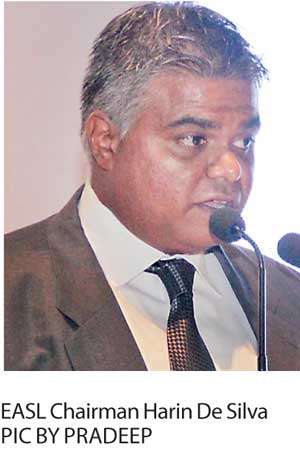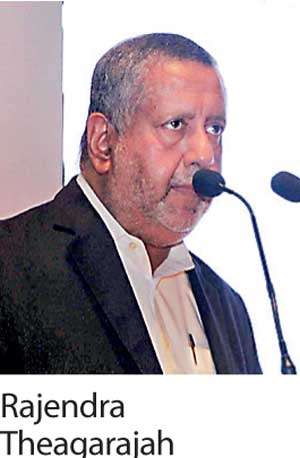16 Jul 2018 - {{hitsCtrl.values.hits}}
 By Nishel Fernando
By Nishel Fernando
Exporters blamed the absence of a “strong and positive political will and vision,” as the reason behind Sri Lanka’s failure to achieve full export potential, and urged the government to focus on providing greater transparency, accountability and speedy implementation of policy initiatives.
“Sri Lanka’s export fraternities’ ambition of working with a government, that was focused on bringing about good governance and ushering in a new era for Sri Lankan exports, has not panned out as we hoped,” Exporters Association of Sri Lanka (EASL) Chairman Harin De Silva told the business sessions of EASL’s 21st Annual General Meeting held in Colombo last Friday.
“Time and again the EASL has stressed the importance and need for a strong and positive political will and vision to drive the export sector of our country in order to reach its full potential. But sadly it seems that our pleas have gone in vain,” he added.
De Silva drew his attention to the prevailing political uncertainty in the country, pointing out that it has put many things on hold.
“The country as a whole seems to be in a political limbo with a wait and see mindset.
“Communal unrest seems to be making its presence felt yet again with the communal violence that erupted in Teldeniya in March this year. Daily demonstrations on the streets of Colombo continue to cause great inconveniences to the daily life of the people and businesses,” he emphasized.
Speaking on transparency, De Silva placed emphasis on getting more export sector stakeholders involved in the ongoing FTA negotiations, by obtaining their feedback on a timely manner. He proposed the government to set up a structured mechanism with a robust communication strategy to achieve this objective.
With regard to research and development (R&D), he called the government to expedite the implementation of converting the current Coordinating Secretariat for Science, Technology and Innovation (COSTI) to National Science Technology and Innovation Coordinating Authority (NASTICA), where the focus will be on commercial ventures.
The Cabinet of Ministers has approved the proposal in this regard early last year, which was also included in last year’s budget proposals. However, there was no significant progress made in the implementation of the proposal to-date.
“The implementation of this strategy needs to be dynamic with strong instuitional framework for effective public and private sector coordination. The success of the strategy will be the re-orientation of the present mindset on research institutions,” De Silva stressed.
Meanwhile, presenting the third version of EASL’s recommendation to the National Export Strategy (NES), he also proposed the government to introduce a scheme similar to the Export Development and Investment Scheme (EDISS) that was introduced in the 1980s, taking into account the current developments and the tax framework.
“This is for the promotion and development of both traditional and non-traditional exports with a focus on both value addition and service-oriented exports.”
Speaking on removing the current constraints on exporters in terms of market access, he made suggestions to develop an export promotional portal leveraging on the existing institutional setup of the government and private sector to provide up-to-date market information on the opportunities available in strategic export markets for Sri Lanka.
Furthermore, De Silva pointed out that the country branding initiatives should be coordinated and complimented with a supportive trade finance regime.
Speaking of the investment climate, De Silva stressed that the digitisation of the country’s land bank remains crucial for both local and foreign investors, to make sound investment decisions.
CCC chief wants private sector to up their game
 The head of Sri Lanka’s premier business chamber wants the country’s private sector to up their game and the government to expedite crucial policy initiatives such as removing trade barriers and facilitation of skilled migration to the country to improve export competitiveness.
The head of Sri Lanka’s premier business chamber wants the country’s private sector to up their game and the government to expedite crucial policy initiatives such as removing trade barriers and facilitation of skilled migration to the country to improve export competitiveness.
Caption
Addressing the post business session of 21st Annual General Meeting of the Exporters Association of Sri Lanka (EASL) last Friday, Ceylon Chamber of Commerce Chairman Rajendra Theagarajah said the private sector should back the courageous policy initiatives such as removal of para-tariffs and other tariffs, which are withholding the competiveness of Sri Lankan exports, while also stressing the importance of relaxing immigration laws to attract skilled workers to face the shortage of skilled workers.
He emphasised that Sri Lankan exporters should capitalise on opportunities arising from a depreciating currency, rather than calling for more protection.
He noted that a complete review of Sri Lanka’s tariff and para-traiff structure is needed to harmonise tariffs with the rest of the region to remain competitive, and hence urged the private sector to back the government to fully implement the initiative.
Theagarajah stressed that the value-added exports have become equally important when growing exports.
“It’s not just about growing exports. We need imports to improve connectivity and competitiveness of our exports,” he stressed.
Theagarajah expressed dissatisfaction over private sector investments in research and development (R&D), while urging the private sector to link up with local universities for R&D initiatives.
“Exporters need to do some soul searching. Ask yourselves, whether you are engaging with start-ups and investing in the future. Do you plough back at least half a percentage to invest in innovation?
“Are you investing and collaborating with universities to develop new products and solutions? Or are you waiting for someone else like the government to do that for you?” he questioned.
Referring to a recent survey conducted by ACCA and KPMG, he said that less than one-in-five business executives knew about China’s Belt and Road Initiative which is a US $4 trillion trade initiative that includes Sri Lanka.
Theagarajah noted that Malta might be a better example for Sri Lanka to draw lessons, which is located in Europe in a similar strategic location to Sri Lanka as it does in South Asia.
He pointed out that Malta, which doesn’t have any natural resources, has been successful in boosting exports, which makes up about 60 percent of its GDP now through open immigration policies, developing its free port and allowing anybody who wants to go into Europe to come and add value through their country.
“We have the greatest window to South Asia, but are we doing enough to encourage those who should be coming here and add value,” he questioned.
Theagarajah also noted that Sri Lanka hasn’t been successful in attracting the diaspora community and their investments back into the country.
He pointed out that lack of quality education and healthcare acts as the main barrier in attracting them back to the country. Hence, he urged the private sector to invest in these sectors.
17 Nov 2024 17 Nov 2024
17 Nov 2024 17 Nov 2024
17 Nov 2024 17 Nov 2024
17 Nov 2024 17 Nov 2024
17 Nov 2024 17 Nov 2024